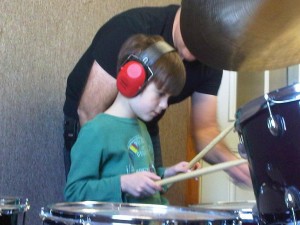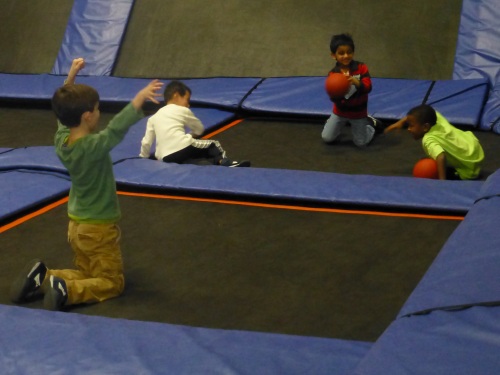Good grief was Saturday’s soccer game ugly. Our outdoor season with Highland Youth Recreation League got off to a smashing start the Saturday before last. Our team had five really solid players, one player who is new to the formal game but has some definite moves, one player who is afraid of the ball and doesn’t want to play much, one player with attention issues who wanders out of the game (mentally or physically, sometimes both) and doesn’t want to play much, and one player with Asperger’s who struggles to understand the game and doesn’t want to play much. And one player who quit the team before the first practice.
Still, in division 2 (6-7-year-olds), five solid players will set you up for a good, competitive game. Unfortunately, this Saturday’s game saw the two absolute best players gone for birthday parties and another top player, Simon, running at about 60% due to fatigue. He’s had trouble with allergies and growing pains this week, and his sleep has suffered. So there we were, fielding a team with 3 1/2 players who wanted to play and understood the game, one player jumping away from the ball whenever it got anywhere near her (including when she played goalie–disaster!), one player who seemed confused and quit playing, and one player we could barely get on the field at all and who tried to take the ball from his own team-mates when he did play.
Those were the longest 40 minutes of my life. I think the score was around 12-0; it might have been worse. The other team started taunting ours on the field, singing out the score. Simon was in tears from humiliation and fatigue. And at the end, when the teams lined up for handshakes and “good games”, at least one little brat on the other side (not even one of their good players, might I add) called out “bad game, bad game” as he passed our demoralized crew.
At which point I blew:
“Hey! You do NOT talk like that! That is NOT nice. That is NOT good sportsmanship. That is NOT the HYR way. Do you understand me?”
Except that was really in ALL CAPS because I was angry and loud, upset with how the game went and with my adrenaline levels high. Someone was going to pay for this on-field massacre, and the little creep who dared to taunt made for a fine target.*
I’ve already been warned that the same two players are likely to miss one to two more games this season, which could very easily set us up for a repeat.
Then there is poor Simon. Poor, sensitive, competitive Simon. He saw the writing on the wall early and did not want to stay in the game. He was legitimately tired, so I let him come out for a quarter. But as players increasingly abandoned the field, we needed him. So, for the first time ever, I told him he had to get in there and play no matter what. No matter how tired. No matter the side stitch. No matter the humiliation.
“Listen, honey. No one likes getting beaten like this. I’m not having a good time, either. But we’re on this team, and we can’t let the other kids down by not trying our best. You know how Mr. Cowan (the Assistant Principal) at Brandeis always says the Brandeis way is to try hard and do your best? Well, that’s what you have to do. Even if you can’t run much. Even if you don’t feel good. We’re going to lose, and you aren’t at 100%. I know that. But you have to get in there and play right now, even if you play on your hands and knees. So get in there.”
And he did. And things were marginally OK until the taunting began, at which point he broke down in tears and wanted off the field.
Did I mention how long this game seemed?
We’ve got five games left, and I’m hoping they won’t all be this miserable. Actually, what I’m really hoping for is a rain-out or two. The spirit of HYR is that everyone plays equal time regardless of ability, that we don’t keep score, and that we make the game a positive atmosphere for players, parents coaches, and refs. Between scheduled absences, lack of interest, and developmental challenges, that’s not looking real likely for this team this season. Or more accurately, I haven’t figured out how to make it a positive experience for kids on both ends of the ability scale.
Simon wants to play with kids who are good and improve his skills. He’s the happiest playing with kids who are better than him—kids he can look up to and learn from. He’s working on an offensive spin-move (internally referred to as “Giles Barnes leaves the Sunderland defense in a twist”, an apparent 500 Greatest Goals reference) for crying out loud and tries to space the field, but Saturday no one would pass to him or get into position to be passed to. I think I can spin this as Simon having a chance to mentor younger and/or more inexperienced players, but if they aren’t interested or can’t/won’t listen, that doesn’t really work.
Matt tells me that I’ve let one horrible game get to me. That we’ll have our two best players back for most of the games, that Simon will feel better, and that we’ll have an OK time. I remain to be convinced. In fact, our practices and this last game were bad enough that I’m left wondering if an open-to-all, non-competitive soccer league is the right place for us.
—–
* I’m increasingly losing my temper with mean kids at preschool, too. Two months ago, when a kid said or did something hateful I’d respond with, “Now, X, let’s not talk like that” or “We’re all friends in here; let’s get to Spanish.” But now? Now I go straight to “What was that you just said? Listen here, X, one more word out of your mouth like that and you are out of here and in Ms. Shary’s office. Do you understand me?”

